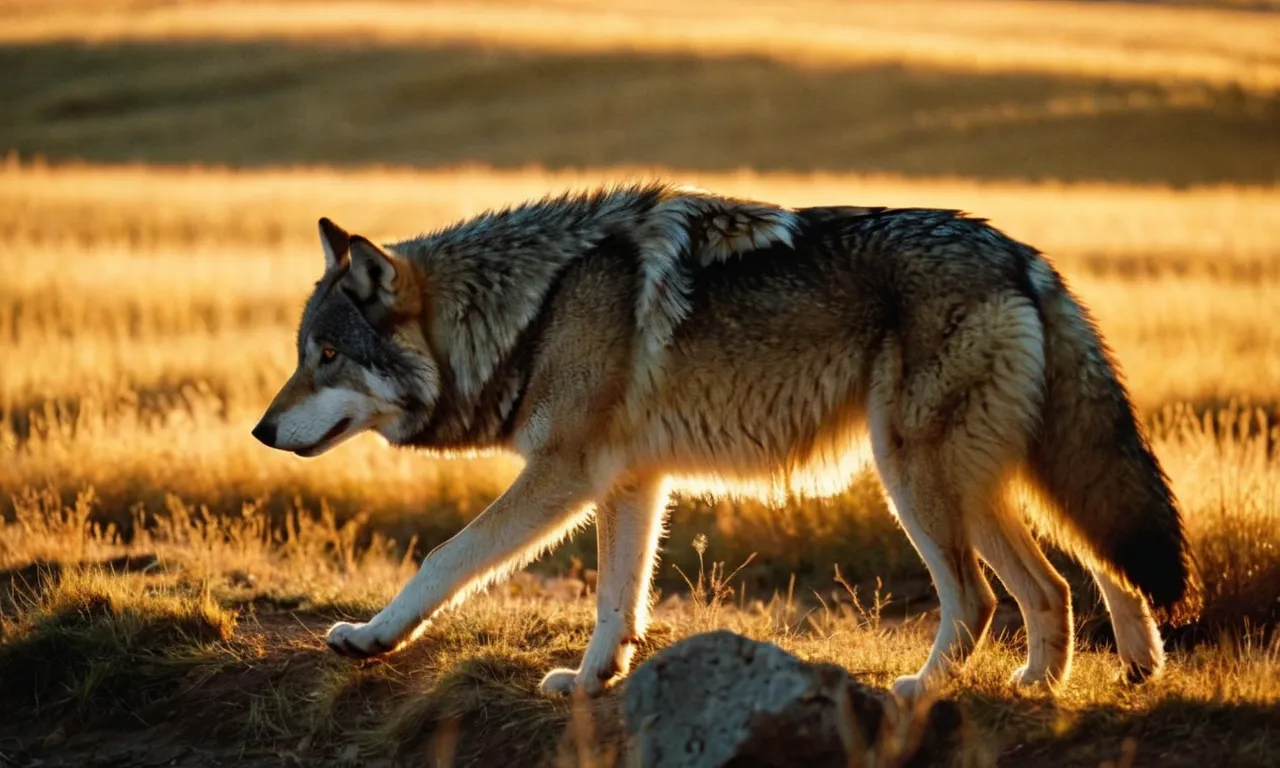What Does The Bible Say About Wolves?
Wolves have captured the human imagination for centuries. Their mysterious howls in the night, fierce pack hunting skills, and fearsome reputation have led to many different interpretations of what wolves represent.
If you’re wondering what the Bible has to say about these powerful creatures, read on for a comprehensive look at the symbolism and meanings of wolves in scripture.
If you’re short on time, here’s a quick answer to your question: The Bible contains both negative and positive symbolic meanings for wolves. They are often associated with danger, destruction, and evil, but also with provision, loyalty, and protection.
Wolves Symbolize Danger and Destruction
Wolves Devour and Destroy (Jeremiah 5:6, Zephaniah 3:3)
In the Bible, wolves are often used as a metaphor for greedy, vicious enemies that seek to destroy God’s people. Jeremiah 5:6 warns, “Therefore a lion from the forest shall slay them, a wolf from the desert shall destroy them.” This refers to God sending enemies like wolves to punish sinful Judah.
Zephaniah 3:3 similarly labels corrupt Jerusalem officials as “roaring lions; her judges are evening wolves that leave nothing for the morning.” Just as wolves viciously devour their prey, God’s enemies would destroy and plunder His people.
According to Gill’s Exposition, the wolf metaphor in Jeremiah 5:6 depicts cruel conquerors that would lay waste to Judah and Jerusalem. The attacking Babylonians are elsewhere described as having “the teeth of a lion” (Joel 1:6). Their viciousness echoes the ravenous nature of wolves.
Ferocious Wolves Will Scatter the Flock (Ezekiel 22:27, Matthew 7:15, Acts 20:29)
Along with imagery of literal wolves attacking sheep, the Bible uses wolves metaphorically to describe false prophets and teachers that spiritually attack and scatter God’s people:
- Ezekiel 22:27 – Israel’s leaders are “like wolves tearing the prey“, greedily shedding blood and destroying lives.
- Matthew 7:15 – Jesus warns of “false prophets, who come to you in sheep’s clothing but inwardly are ravenous wolves“. They pretend to be godly while working to destroy the faith of believers.
- Acts 20:29 – Paul warns that “fierce wolves” (false teachers) will rise up from among church leaders and “will not spare the flock“.
In contrast to the good shepherd Jesus who lays down His life for the sheep (John 10:11), evil wolves selfishly exploit and scatter the flock. Modern false teachers continue to spiritually ravage many today through their greed, deception, and manipulation.
| Good Shepherd (Jesus) | Evil Wolves |
|---|---|
| Sacrifices life for sheep | Destroy and scatter sheep |
| Leads to good pastures | Lead sheep astray |
| Comforts the wounded | Wound and exploit sheep |
As in biblical times, ferocious wolves in sheep’s clothing abound today. We must test them by God’s Word (1 John 4:1-3) and follow the Good Shepherd, who alone can protect us from spiritual deception and destruction (John 10:27-28).
Wolves Represent Greed and Evil
Greedy Religious Leaders are Like Wolves (Ezekiel 22:27, Matthew 7:15, Acts 20:29)
The Bible compares greedy religious leaders to savage wolves in several passages. Ezekiel 22:27 states that the leaders of Jerusalem “are like wolves tearing the prey“; they shed blood and destroy people for dishonest gain.
Matthew 7:15 warns to “beware of false prophets, who come to you in sheep’s clothing but inwardly are ravenous wolves“. This depicts religious imposters as dangerous predators disguising their true greedy nature.
Furthermore, Acts 20:29 cautions that “fierce wolves will come in among you, not sparing the flock”; implying churches face threats from deceitful, greedy leaders.
These verses demonstrate how Scripture uses wolves as symbols of religious deception and exploitation for power, status, or wealth. Just as wolves viciously prey on vulnerable sheep and livestock for food, these leaders unscrupulously prey on believers for selfish gain rather than caring for their wellbeing.
Their extreme greed likens them to vicious beasts fixated on ripping apart victims to profit from them. So the Bible warns disciples to beware of their cunning distortion of truth and mask of righteousness concealing inner rapacity.
The Devil is Compared to a Wolf (John 10:12)
In addition to analogies regarding religious leaders, John 10:12 directly compares the Devil to a wolf, stating that false shepherds abandoning flocks to wolves picture “the thief who comes only to steal and kill and destroy“. This correlates wolves with the devil seeking victims to harm and devour.
It contrasts good shepherds protecting sheep with evil thieves prowling to strike undefended targets for destruction and death. This demonstrates how Scripture uses wolves to personify Satan’s sinister spiritual forces bent on attacking, scattering, and ruining God’s people.
So in this imagery, the Devil epitomizes the ultimate ravening wolf – the original murderer and tempter depicted as “a roaring lion seeking someone to devour” (1 Peter 5:8). His agents follow in his footsteps, both human and demonic.
Therefore, disciples must be vigilant against all greedy, exploitative leaders and influences infiltrating churches to spiritually endanger Christ’s flock. Scriptural wolf symbolism serves to awaken caution about such threats.
Positive Symbolism of Wolves
God Feeds His People Like a Shepherd Feeds His Flock (Psalm 23:1-2, Isaiah 40:11)
The Bible often compares God to a shepherd who tenderly cares for his flock. In Psalm 23, David expresses trust that the Lord will provide for and guide him, stating “The Lord is my shepherd, I lack nothing. He makes me lie down in green pastures, he leads me beside quiet waters” (Psalm 23:1-2).
Isaiah 40:11 echoes this imagery: “He tends his flock like a shepherd: He gathers the lambs in his arms and carries them close to his heart; he gently leads those that have young.” Just as a shepherd lovingly feeds and protects his sheep, God will supply the needs of His people.
The Wolf Dwells with the Lamb (Isaiah 11:6, Isaiah 65:25)
According to two prophecies in Isaiah, there will come a future day of peace when even natural enemies like wolves and lambs will live in harmony. Isaiah 11:6 declares, “The wolf will live with the lamb, the leopard will lie down with the goat, the calf and the lion and the yearling together; and a little child will lead them.”
Isaiah 65:25 echoes, “The wolf and the lamb will feed together, and the lion will eat straw like the ox.” Though wolves prey on lambs in our present world, God promises a coming day when all creation will be restored to joyful unity under Christ’s rule.
Wolves Provide for Their Young (Matthew 7:9-11, Luke 11:11-13)
Jesus uses the caring habits of wolves for their pups as an analogy for God’s willingness to generously provide for His children: “Which of you, if your son asks for bread, will give him a stone? Or if he asks for a fish, will give him a snake?
If you, then, though you are evil, know how to give good gifts to your children, how much more will your Father in heaven give good gifts to those who ask him!” (Matthew 7:9-11). Though humans are naturally sinful, even we manage to feed our young – how much more will our perfect Heavenly Father care for His own!
Conclusion
As we have seen, wolves have both negative and positive symbolic meanings in the Bible. They represent evil forces that seek to harm God’s people, but also protective, providing traits when referring to God himself.
By studying the full context of biblical wolf references, we gain a nuanced understanding of the animal’s importance. The wolf’s dominance and wild nature contribute to complex metaphorical roles that vary across different passages.








